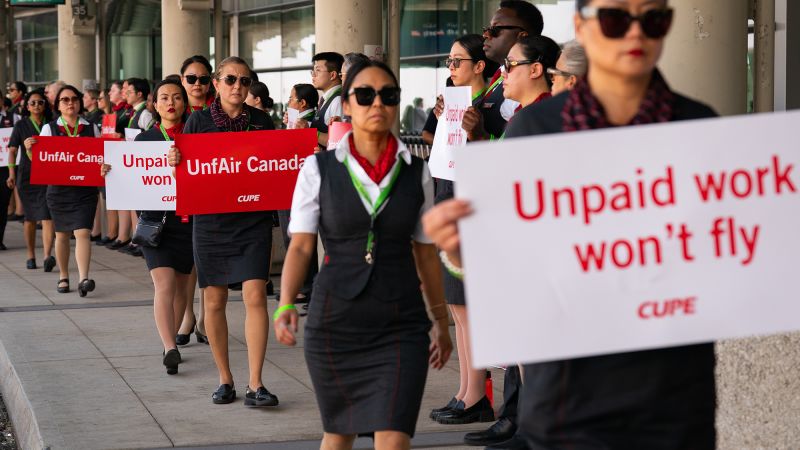Air Canada is currently bracing for a significant disruption in its operations as the airline prepares to lock out its flight attendants. This decision follows a vote by the attendants to strike, leading to potential travel interruptions that might begin as soon as Thursday. If no resolution is reached, these disruptions could persist, significantly impacting air travel for many customers.
The airline has announced that it will halt operations beginning on Saturday and may remain shut down until an agreement is finalized. This drastic action comes amidst the backdrop of intense negotiations and conflict between Air Canada and the flight attendants’ union, represented by the Canadian Union of Public Employees (CUPE). The union has formally issued a strike notice, which has prompted Air Canada to enact a 72-hour lockout notice effective from August 16. Notably, the support for the strike is overwhelming, as 99.7% of union members voted in favor of it.
Wesley Lesosky, president of the Air Canada Component of CUPE, articulated the union’s standpoint, stating, “For the past nine months, we have put forward solid, data-driven proposals on wages and unpaid work, all rooted in fairness and industry standards.” He expressed disappointment in Air Canada’s lack of serious engagement with these proposals, emphasizing that the airline’s response effectively illustrates a disinterest in resolving these pivotal issues.
After eight months of back-and-forth negotiations, the airline reported that despite offering to enter arbitration, the two parties could not reach an agreement. On August 11, Air Canada presented a proposal to the union which included a substantial 38% increase in compensation over four years along with other promising benefits and protections. However, the union opted to issue a strike notice instead of accepting this proposal, further escalating tensions.
Consequently, Air Canada is initiating its contingency plan to manage the operational wind-down. A statement from the airline indicated that they would start to implement measures leading to an orderly cessation of operations. They expect that the first flight cancellations will occur on August 14, with more cancellations on the following day, eventually leading to a total halt by August 16.
The operational scale of Air Canada is considerable, with the airline managing nearly 430 flights every day between Canada and over 50 airports in the United States. Typically, the airline serves around 130,000 customers on a daily basis, underscoring the scale of impact that this strike and subsequent lockout could have on travelers and the broader aviation market.
The union is advocating for significant changes, including 100% pay for all hours worked and adjustments to address the rising cost of living. Notably, boarding pay — which refers to the common practice where flight attendants do not receive full hourly compensation for critical phases of the flight — has been a major topic of negotiation, as many US airlines have also faced scrutiny over this issue.
Canadian Minister of Jobs and Families, Patty Hajdu, has actively engaged in the situation, stating that she has met with representatives from both the flight attendants’ union and the airline. She mentioned that federal mediators would remain available in hopes of facilitating an agreement between the parties involved. “I am closely monitoring the situation and encourage both parties to stay at the table until a deal is found,” her statement asserted, reinforcing the government’s desire for a prompt resolution to the escalating conflict.
The circumstances surrounding the Air Canada strike situation highlight the complexities of labor relations in the aviation sector, where negotiations often hinge on issues such as compensation, working conditions, and the financial pressures faced by employees. The unfolding events serve not only to impact those directly involved but also to illustrate the vulnerabilities in travel industry logistics that can affect numerous stakeholders.











